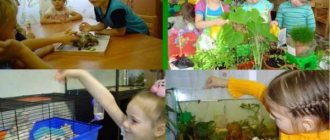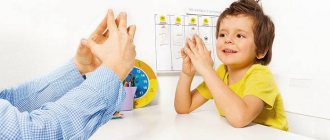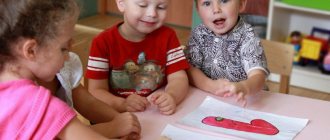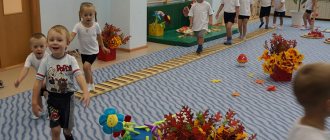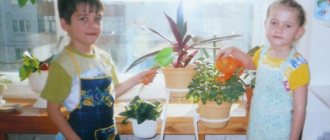PEDAGOGY DEVELOPMENT OF COGNITIVE-SEARCH ACTIVITY IN CHILDREN OF PRE-SCHOOL AGE
Transcript
1 PEDAGOGY Shmakova Natalya Anatolyevna senior teacher Postolova Tatyana Viktorovna teacher Golik Marina Valerievna teacher MDOU “D/S combined type 8 “Teremok” Podolsk, Moscow region DEVELOPMENT OF COGNITIVE-SEARCH ACTIVITY IN CHILDREN OF YOUNG PRESCHOOL AGE Abstract: the article describes the influence of experience but research activities to develop the cognitive abilities of children of primary preschool age, their ability to analyze and draw simple conclusions. The authors note the manifestation of initiative in children during research activities, as well as an increase in the level of culture of thinking, development of communicative, intellectual and personal qualities. Key words: experiment, search activity, curiosity, cognitive orientation, cognitive activity, experience. Young children are explorers by nature. They want to experience everything themselves, to be surprised by the unknown. They develop curiosity and a desire to understand the patterns of the world around them. That is why it is very important to make the child’s interest and curiosity a controlled process, and most importantly, useful for him from the point of view of cognitive, moral, and aesthetic development. The child’s cognitive interest should give rise to good feelings in him and be turned in a useful direction. Currently, the preschool education system faces an urgent task: searching for a reasonable system for achieving the quality of preschool
2 Center for Scientific Cooperation “Interactive Plus” of education aimed at developing the communicative, intellectual and personal qualities of the child; the formation of prerequisites for educational activity in children, which requires children not only to possess knowledge, but also to be able to obtain this knowledge independently and operate with it. Cognitive development of children is one of the important areas in working with preschool children. Any normal child is born with an innate cognitive orientation that helps him adapt to new conditions of his life. Gradually, cognitive orientation develops into cognitive activity - a state of internal readiness for cognitive research activities, manifested in children in search actions aimed at obtaining new impressions about the world around them. The tasks of research and experimentation are specific to each age. In early preschool age, this is: children’s entry into a problematic play situation (the leading role of the teacher); activating the desire to look for ways to resolve a problem situation (together with the teacher); formation of initial prerequisites for search activity (practical experiments). Why is this topic relevant to us? Observing children of primary preschool age, we realized that children undergo systematic cognitive activity through all types of activities. This is especially relevant at the present stage, since it develops children's curiosity, an inquisitive mind and forms on their basis stable cognitive interests through research activities. Is it possible to organize research activities with children of primary preschool age? We answer: “Yes.” The youngest preschooler is characterized by an increased interest in everything that happens around him. Every day children learn more and more new subjects, strive to learn a new word in science: development prospects
3 not only their names, but also their similarities, think about the simplest causes of the observed phenomena. For example: why a ball rolls but a cube doesn’t, why a cat has 4 legs and a bird only has 2, etc. While maintaining children’s interest, you need to lead them from acquaintance with nature to understanding it. In order for the experimentation games to be successfully carried out in the group, an appropriate spatial environment developing the subject is created, in which the main place is given to the “Sand Water” experimentation center. Parents gladly responded to the request to take part in replenishing the necessary equipment: shells, pebbles, various containers, funnels, plastic jars, sponges, corks... All this allowed us to conduct all kinds of game experiments. During the games, children learned that water has no taste or smell, that heavy objects (pebbles) sink in water, but light objects (foam rubber, corks, feathers...) do not. The children watched with great interest that the water could be “colored”; they happily colored the water in different colors. From the fairy tale “About a Little Drop”, children learned that when it is very cold, water can turn into ice, and the sun will help it return back, that water has its own “song” in the room for psychological relief, they watched how water flows into fountain, listened to audio recordings of the noise of the sea and rain. Through experimentation, children understand that plants, birds, fish and humans cannot live without water. To do this, we look at pictures with children and take care of plants. In the process of work, we introduce children to the properties and qualities of such a material as stone: they can be large and small, heavy and light, hard, and sink. Buildings can be made from stones. Stones, sand, water are constantly present in the group. Together with the children, we study their properties, play with them, make crafts that later become decorations for the group: we laid out and painted “Seven-flowered Flower” from stones, built a path to the bunny’s house... Here creative qualities are manifested, imagination and sensory abilities are developed. We repeat experience and observations, complicate them, transfer them from the group to the subject
4 Center for Scientific Cooperation “Interactive Plus” environment and vice versa. In general, we try to include research activities in different types of activities: a game, a lesson, a walk. In the process of work, playing with children, problematic situations are created that allow the child to draw some independent conclusions. For example, developing the plot of a role-playing game, children are invited to make pies to treat their dolls, using dry sand. An attempt to make pies out of it initially ends in failure, while the children themselves realize that they are not succeeding and why. Failure directs attention to identifying the properties of sand. The emerging problem situation activates the cognitive activity of children. To find a way out of this situation, I suggest that the children wet the sand and try to make pies again. The children are happy to note that this time they succeeded. A problematic situation, failure in an activity, replacement of a material and its sensory examination leads to an awareness of the properties of the material (you can sculpt from wet sand); children become familiar with examination methods to identify properties (squeeze, press with the palm of your hand), as well as ways to make sand suitable for sculpting. All senses are included in the process of cognition. The baby listens, looks, tastes, catches smells, discovering a variety of signs of objects. To do this, children become familiar with examination methods. Their formation occurs as the child masters auditory sensory standards (scale of musical sounds, speech phonemes); visual (color spectrum, geometric shapes); tactile (ideas about such properties as hot cold, soft hard, smooth rough); olfactory. With the help of experimentation, it is easier for a child to understand and establish connections and patterns in the world around him. Everyone knows that the main thing a child learns at home is from communicating with his parents, participating in everyday activities, and observing the actions of family members. Parents can do a lot for development using natural situations (on the way home, at home in the kitchen, in the store, New word in science: development prospects
5 bathing a child...). That is why parents are necessarily involved in jointly resolving these issues. We aim parents to understand that curiosity is a character trait that needs to be developed from an early age, and that the innate need for new experiences forms the basis for the harmonious all-round development of a child. Conclusion: in the course of the work, it was revealed that children became more independent, curious, showed an interest in experimenting, and broadened their horizons. Thanks to this, most children are proactive and active in communication, and close contact has been established with their parents. All this creates a good basis for the development of curiosity and sensory concepts in children. Preschoolers’ own research searches help to increase the level of culture of thinking in children, and the development of the child’s communicative, intellectual and personal qualities. References 1. Perelman Ya.I. Entertaining tasks and experiments. Ekaterinburg, Murudova E.I. Familiarization of preschoolers with the world around them. Childhood press, Dybina O.V. Classes on familiarization with the outside world in the second junior group of kindergarten: Methodological manual. M.: Mozaika-Sintez, Valitova Z.F. Cognitive and research activities with children in the 2nd junior group [Electronic resource]. Access mode: detskiy-sad/upravlenie-dou/2014/01/29/poznavatelno-issledovatelskaya-deyatelnost-sdetmi-vo-2
Junior group
Perform actions in accordance with the suggested icon. Determine the content of the activity (for example, talk about the properties of a material or object).
Learn to consider a phenomenon as a system, a set of stable connections between the components of the phenomenon along the present-past-future line to identify the interconnections of objects of the man-made world (for example, a tree stump, a stool, a chair, an armchair) or living nature (an egg, a chick, a hen).
Middle group
I. Perform a series of sequential actions (conduct experiments) in accordance with the models. Define goals and achieve appropriate results.
II Develop the ability to analyze and identify essential features of substances, materials, objects.
Using a systematic approach, form an idea of yourself (past, present, future; structure of body parts, etc.), your family (family members as parts of a system in temporal development). Expand your understanding of objects and phenomena of nature and the man-made world, identifying their relationships and interdependencies. Understand what a function is.
Senior group
Act in accordance with models that determine the conditions and content of activities:
make assumptions about the expected result, designate it with
using a conventional symbol;
determine the purpose of the activity, the conditions for its achievement;
With the help of an adult, draw up a model of the stages of activity.
Be able to compare the results of activities with the goal and adjust your activities.
Analyze, identify essential features of substances, materials, objects, features of their interaction.
Get acquainted with the concepts of line, system, subsystem. Connections with systems and non-systems. Analyze objects, objects and phenomena of the surrounding world, their internal and external connections, the inconsistency of their properties, changes over time, etc.
Preparatory group
Preschoolers should be able to independently act as a group in school in accordance with the algorithm, achieve a result and indicate it using a conventional symbol. For the designated purpose, draw up an algorithm, defining the equipment and actions with it. Detect discrepancies between goals and actions and adjust your activities.
Improve the ability to determine and analyze the structure, properties, characteristics, features of the interaction of substances, materials, objects. Independently (based on models) conduct experiments with substances (the interaction of solid, liquid and gaseous substances, changes in their properties during heating, cooling and mechanical influences).
Develop the ability to analyze an object and present it in a system of relationships and interdependence (structure, functioning, purpose; its existence in time and space, etc.).
